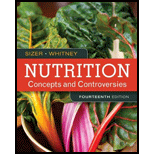
Nutrition: Concepts and Controversies - Standalone book (MindTap Course List)
14th Edition
ISBN: 9781305627994
Author: Frances Sizer, Ellie Whitney
Publisher: Brooks Cole
expand_more
expand_more
format_list_bulleted
Concept explainers
Question
Chapter 3, Problem 4SC
Summary Introduction
Introduction:
Blood is the fluid which carries the essential compounds such as nutrients and oxygen to all the cells of the body and carries away the
Expert Solution & Answer
Trending nowThis is a popular solution!

Chapter 3 Solutions
Nutrition: Concepts and Controversies - Standalone book (MindTap Course List)
Ch. 3 - Moderate alcohol use has been credited with...Ch. 3 - Your daughter is leaving for college in the fall....Ch. 3 - Cells a. are self-contained, living units. b....Ch. 3 - Each gene is a blueprint that directs the...Ch. 3 - Prob. 3SCCh. 3 - Prob. 4SCCh. 3 - Hormones a. are rarely involved in disease...Ch. 3 - Prob. 6SCCh. 3 - Prob. 7SCCh. 3 - Prob. 8SC
Knowledge Booster
Learn more about
Need a deep-dive on the concept behind this application? Look no further. Learn more about this topic, health-nutrition and related others by exploring similar questions and additional content below.Similar questions
- The bile from the liver is delivered to the _______. a. stomach b. liver c. small intestine d. colonarrow_forwardFigure 16.7 Which of the following statements about the digestive system is false? a. Chyme is a mixture of food and digestive juices that is produced in the stomach. b. Food enters the large intestine before the small intestine. c. In the small intestine, chyme mixes with bile, which emulsifies fats. d. The stomach is separated from the small intestine by the pyloric sphincter.arrow_forwardFigure 34.11 Which of the following statements about the digestive system is false? Chyme is a mixture of food and digestive juices that is produced in the stomach. Food enters the large intestine before the small intestine. In the small intestine, chyme mixes with bile, which emulsifies fats. The stomach is separated from the small intestine by the pylloric sphincter.arrow_forward
- After triglycerides are absorbed, they leave the cell and move into the ________. a. bloodstream b. intestinal cells c. liver d. lactealsarrow_forwardWhich of the following statements is not true? a. Essential nutrients can be synthesized by the body. b. Vitamins are required in small quantities for bodily function. c. Some amino acids can be synthesized by the body, while others need to be obtained from diet. d. Vitamins come in two categories: fat-soluble and water-soluble.arrow_forwardFigure 34.19 Which of the following statements about digestive processes is true? Amylase, maltaseT and lactase in the mouth digest carbohydrates. Trypsin and lipase in the stomach digest protein. Bile emulsifies lipids in the small intestine. No food is absorbed until the small intestine.arrow_forward
arrow_back_ios
arrow_forward_ios
Recommended textbooks for you
 Comprehensive Medical Assisting: Administrative a...NursingISBN:9781305964792Author:Wilburta Q. Lindh, Carol D. Tamparo, Barbara M. Dahl, Julie Morris, Cindy CorreaPublisher:Cengage Learning
Comprehensive Medical Assisting: Administrative a...NursingISBN:9781305964792Author:Wilburta Q. Lindh, Carol D. Tamparo, Barbara M. Dahl, Julie Morris, Cindy CorreaPublisher:Cengage Learning Concepts of BiologyBiologyISBN:9781938168116Author:Samantha Fowler, Rebecca Roush, James WisePublisher:OpenStax College
Concepts of BiologyBiologyISBN:9781938168116Author:Samantha Fowler, Rebecca Roush, James WisePublisher:OpenStax College

Comprehensive Medical Assisting: Administrative a...
Nursing
ISBN:9781305964792
Author:Wilburta Q. Lindh, Carol D. Tamparo, Barbara M. Dahl, Julie Morris, Cindy Correa
Publisher:Cengage Learning

Concepts of Biology
Biology
ISBN:9781938168116
Author:Samantha Fowler, Rebecca Roush, James Wise
Publisher:OpenStax College



